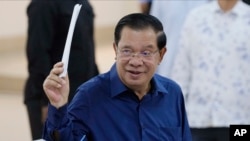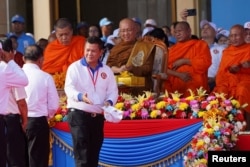Cambodia’s July 23 election, which media described as a “one horse race,” ended with Prime Minister Hun Sen’s ruling Cambodian People’s Party (CPP) winning by a landslide.
Analysts correctly predicted that Hun Sen, who has ruled Cambodia for 38 years, would pass the torch to his son Hun Manet, who heads Cambodia’s army.
On July 26, Hun Sen officially announced he was stepping down, and that Hun Manet would take over in three weeks. Hun Sen said he would continue to “control politics as the head of the ruling party.”
The government maintains the poll embodied Cambodia’s “vibrant democracy.”
“The voting process exemplified a genuine political pluralism, offering Cambodian citizens and their respective political parties with an equal and fair opportunity to engage in political contests within the confines of the law,” Cambodia’s foreign ministry said on July 25.
That is false.
In the run up to the election, Cambodian authorities systematically sought to eliminate political pluralism. They banned the only viable opposition party, turned the judicial system against opposition political figures, shuttered one of the last independent media outlets and criminalized legitimate forms of political protest.
The election resulted in anything but a pluralistic outcome, with the CPP capturing 120 of 125 seats in parliament. The National Front for an Independent, Neutral and Cooperative Cambodia (FUNCINPEC) won the other five seats. This royalist party “has evolved into a tamed opposition force that rarely challenges the ruling party's actions,” The Associated Press said.
In the 2018 election, the CPP secured all 125 seats in the National Assembly (lower house) and all 58 elected seats in the Senate. That sweep occurred after the main opposition Cambodia National Rescue Party (CNRP) was dissolved in 2017, allowing Hun Sen to run virtually unopposed.
FUNCINPEC’s modest victory in the latest elections helped the Cambodian government put a formal end to what Luke Hunt, a Southeast Asia correspondent for The Diplomat, called Cambodia's “unwanted status as a one-party-state.”
The U.S. State Department determined the elections were neither free nor fair. It imposed visa restrictions on “individuals who undermined democracy and implemented a pause of certain foreign assistance programs.”
Beijing praised the election, with President Xi Jinping touting the strides Cambodia had made under the “correct leadership” of Hun Sen.
The Bangkok-based Asian Network For Free Elections said it was “particularly troubled” by doubts about the independence and neutrality of the National Election Committee (NEC), noting the evidence suggests “a clear bias” towards the CPP.
Freedom House, a Washington-based human rights group, said the CPP has “complete control” over the NEC’s nine seats.
On May 15, the NEC disqualified the Candlelight Party, “considered the country’s only effective opposition party, citing the party’s failure to submit the necessary registration documents.
Reuters described the Candlelight Party as a “weakened reincarnation” of the CNRP.
The Candlelight Party had been allowed to contest earlier local elections, and had a letter from the Interior Ministry, tasked with registering political parties, confirming that it had been registered in 1998.
The Candlelight Party said the original certificate confirming its registration was lost after police confiscated it during a raid.
As Polygraph.info and others previously reported, Hun Sen had threatened physical violence and legal action against opposition members who criticized his ruling party or government.
Candlelight Party members have faced both.
After banning the Candlelight Party, authorities also sought to eliminate other means of protesting the election by amending the election law to penalize those who encouraged an election boycott.
On July 15, two senior Candlelight Party members were arrested for allegedly inciting party members to cast spoiled or void ballots.
Without a viable opposition party running, analysts said that low voter turnout would threaten the election’s legitimacy.
Amnesty International said the election occurred in circumstances where people felt they were “being forced to participate in this election despite their party of choice not being on the ballot.”
Hun Sen warned those who did not vote would be socially ostracized.
“If 98 of 100 families in a village go to vote, the two families who boycott the election could be isolated and their act could be seen as anti-election and they could even be linked to the Third-Generation Traitor [exiled CNRP leader Sam Rainsy],” Hun Sen said in June.
Cambodia’s Ministry of Foreign Affairs and International Cooperation boasted of a high turnout, with an estimated 8,213,260 of 9,710,655 registered voters (84.58%) showing up to vote.
An estimated 440,000 ballots were invalid.
CPP spokesman Sok Ey San said not all the invalid ballots had intentionally been spoiled.
Boycotting elections or spoiling ballots is a form of political protest. One resident of Siem Reap told U.S.-funded Radio Free Asia, a VOA sister news service, that she had been forced to vote by local authorities and spoiled her ballot in response.
Despite the landslide victory, Cambodian police are tracking down opposition activists who spoiled their ballots.
Prime Minister Hun Sen has demanded that those people who spoiled their ballots publicly apologize.






